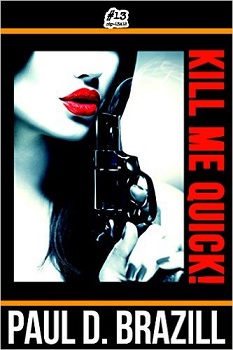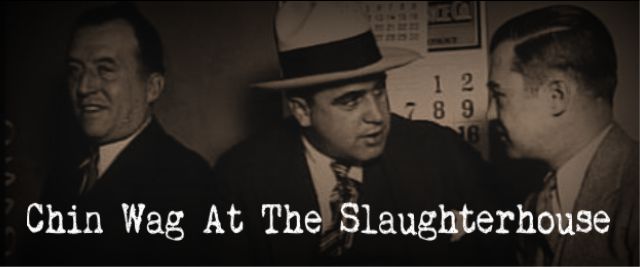
Stephen Bett is a widely and internationally published Canadian poet with 17 books. His poetry is disciplined, musical, witty and culturally honed. He ranges from minimalism to jazz. If you pick up a Bett book you can be assured of first class quality. He is a poet who always delivers. His earlier work is known for its sassy, edgy, hip… caustic wit―indeed, for the askance look of the serious satirist… skewering what he calls the ‘vapid monoculture’ of our times. His more recent books have been called an incredible accomplishment for their authentic minimalist subtlety. Many are tightly sequenced book-length ‘serial’ poems, which allow for a rich echoing of cadence and image, building a wonderfully subtle, nuanced music.
Bett follows in the avant tradition of Don Allen’s New American Poets. Hence the mandate for Simon Fraser University’s “Contemporary Literature Collection” to purchase and archive his “personal papers” for scholarly use.
Tell us about your range of poetry.
My range of interest, after 50 years of reading (& writing) poetry, & 30-plus years of teaching, is reasonably broad―modernism & the postmodern (U.S, UK, & here in Canada). But my influences are narrow: Black Mtn, San Fran Renaissance, & NY School (1st & 2nd generations, & now beyond). Of course I’m also very narrow niche in that I’m a Canadian mentored by these A-muricanos (via the TISH group). That goes back to my ‘counter-culture’ youth―child of the ’60s, blah, blah. I thrive on avant edginess (“Make it new”!) & am bored silly by mainstream bland poetry; in my country there still prevails the hopelessly dull “narrative” poem about great-granddaddy’s homesteading on the prairie, for god sake. (Although there are young envelope-pushers happily breaking through nowadays in Canada, as in the U.S.) But I don’t go for the “language school” poets (although I read them still―to stay in touch). Emperors without clothes (see Tom Clark’s courageous essays on that!). So I’m narrow niche no matter how you hold the map―right-way up, upside down, sideways. Dizzy Canadian, I guess.
How do you think the publishing landscape has changed for a poet?
That’s an easy one, for sure. When I published my first poem in Rolling Stone magazine at age 24 (1972) I thought I ‘had it made’. In truth, it turned out I was half a generation late though. In Canada, at least, in the late ’60s, Prime Minister Trudeau’s “LIP” grants for writers allowed for that generation (my teachers) to start up magazines & presses galore, & publish themselves &, pretty incestuously, their writer friends (check the Mastheads on that!). Well, ok, that’s the luck of the birth draw; I get it. Far better them than no-one. I found I was publishing in a lot of U.S. journals, so that was great. Generally, though… always hard for poets since the ’90s. The League of Canadian Poets’ stats (they’re a union of sorts, & a good organisation), even then in those ‘better’ ’90s days, showed that something like only 2% of ‘seriously writing’ poets actually got books published, & of those who did publish, only 1.5% ever got “reviewed.” (A Peter Ackroyd novel of that time mentions 500 books of poetry a year collecting dust on British library shelves!) Point is, I was doing fairly well, nonetheless, getting multiple reviews of my books; but my last book has had no reviews at all. Zilch. (Rae Armantrout won a Pulitzer a couple of years ago & only had two reviews. Woeful fact. And a supremely wonderful poet!) Poetry, of course, doesn’t sell―that’s the publishers’ mantra, & very true, of course. Those who do maintain a commitment to poetry publishing rely on gov’t grants &/or on subsidizing their small poetry lists from their cookbook sales! (I’m only barely exaggerating.) So it’s always been hard for poets of my generation. So many poets have quit altogether―at least in trying to publish (maybe they still write a soppy poem or two in their bathtubs). I’ve been relatively successful, perhaps mostly because I’ve always been doggedly willing to knock my head against walls. But, even so, I could wallpaper my house walls with 45 years’ of “rejection letters.” I could probably wallpaper yours too. And yours, & yours over there, down the road. A whole street of houses! My parents didn’t teach me the word “quit.” Plus, I’ve always believed in myself (politely, I hope, but steadfastly), & am the eternal optimistic ‘glass is half full’ guy. I’ve been lucky, & I’ve never for a moment stopped working. Thanks mum & dad, cheers!
Who are your literary influences?
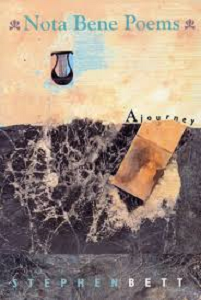 I broadly answered that in the first question―the three U.S. avant “schools.” More specifically: Ed Dorn (mid-to-late Dorn), Robert Creeley, Anselm Hollo, Tom Clark (in about that order). Harold Bloom’s notion The Anxiety of Influence (which I reference in a small few poems written throughout my career) is, I think, inescapable for any writer―up to a point. But, for me at least, at a certain point my own “voice” imposed itself despite these “influences,” or maybe in consort with them, & falling back in on my essential self. I think my own “voice” (better to say, my “personality” & individual concerns) really got stuck in (as they phrase it in my beloved world of football, or soccer) with my 4th book, Nota Bene Poems: A journey. That’s when I also started writing “serial” poems―a book-length poem divided into individual sections, which allows me the joy―the little hair-chilling frisson of pleasure―to echo image, cadence, etc., back & forth in a long form. A pleasure I found, early on, fully operating in Pound’s Cantos. “Serial” poem―the term, I think, first proposed by Jack Spicer, another “influence.” I am familiar with the poetry wars over the term “voice”; I simply take “voice” to refer to one’s own unique (proprioceptive perhaps, to bring that in, too) individual “personality, which surely
I broadly answered that in the first question―the three U.S. avant “schools.” More specifically: Ed Dorn (mid-to-late Dorn), Robert Creeley, Anselm Hollo, Tom Clark (in about that order). Harold Bloom’s notion The Anxiety of Influence (which I reference in a small few poems written throughout my career) is, I think, inescapable for any writer―up to a point. But, for me at least, at a certain point my own “voice” imposed itself despite these “influences,” or maybe in consort with them, & falling back in on my essential self. I think my own “voice” (better to say, my “personality” & individual concerns) really got stuck in (as they phrase it in my beloved world of football, or soccer) with my 4th book, Nota Bene Poems: A journey. That’s when I also started writing “serial” poems―a book-length poem divided into individual sections, which allows me the joy―the little hair-chilling frisson of pleasure―to echo image, cadence, etc., back & forth in a long form. A pleasure I found, early on, fully operating in Pound’s Cantos. “Serial” poem―the term, I think, first proposed by Jack Spicer, another “influence.” I am familiar with the poetry wars over the term “voice”; I simply take “voice” to refer to one’s own unique (proprioceptive perhaps, to bring that in, too) individual “personality, which surely 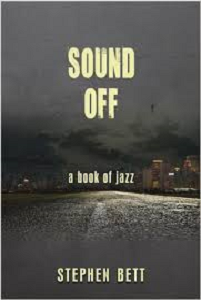 includes body language (hence my love, likewise, for “cool jazz,” especially Nordic jazz, as another body ‘shaping’ influence). Relatedly― to voice & personality―I was saying to a poet friend just a couple of days ago that so many (not all!) of Frank O’Hara’s imitators sound somewhat wooden to me. O’Hara’s notion “Personism,” as practised by him, is filled with his unique insouciance, his lively, chatty, personality-filled “voice”―it’s gossipy, for sure, but that’s not the key point of his “I do this… I do that” style of poetry writing. The point is not just gossip, but daily, quotidian, ‘life’ itself! And deliciously insouciantly stated. (I love sassy, too!) O’Hara was a very early influence, as well, in some ways. Ok, I’m rambling. I do that. (And I think, & write, parenthetically. Perhaps annoyingly so at times, but certainly my own “voice,” my own body language!) Last point, I also feel, as a by-the-way, that Rae Armantrout is currently the most important poet around. Subtly complex, & complexly subtle. Bravo! (I lied―one more, kind of related point: my all-time favourite poem―Creeley’s “I Know a Man.” I always took a couple of one hour classes when ‘teaching’ that short, pithy poem in the classroom. So much going on there! Technically―primarily―& also socio-philosophically.) So, my influences are largely “minimalist” poets, in one shape, style, or another.
includes body language (hence my love, likewise, for “cool jazz,” especially Nordic jazz, as another body ‘shaping’ influence). Relatedly― to voice & personality―I was saying to a poet friend just a couple of days ago that so many (not all!) of Frank O’Hara’s imitators sound somewhat wooden to me. O’Hara’s notion “Personism,” as practised by him, is filled with his unique insouciance, his lively, chatty, personality-filled “voice”―it’s gossipy, for sure, but that’s not the key point of his “I do this… I do that” style of poetry writing. The point is not just gossip, but daily, quotidian, ‘life’ itself! And deliciously insouciantly stated. (I love sassy, too!) O’Hara was a very early influence, as well, in some ways. Ok, I’m rambling. I do that. (And I think, & write, parenthetically. Perhaps annoyingly so at times, but certainly my own “voice,” my own body language!) Last point, I also feel, as a by-the-way, that Rae Armantrout is currently the most important poet around. Subtly complex, & complexly subtle. Bravo! (I lied―one more, kind of related point: my all-time favourite poem―Creeley’s “I Know a Man.” I always took a couple of one hour classes when ‘teaching’ that short, pithy poem in the classroom. So much going on there! Technically―primarily―& also socio-philosophically.) So, my influences are largely “minimalist” poets, in one shape, style, or another.
Do you think a different publishing approach is necessary for a poet today?
Oh my god, please let me avoid a rant (haha)! Necessary,yes. (We’re sort of back to question 2.) The ‘what’ & ‘how’ are, I think, unanswerable. Existing alternatives (self-publishing & e-books) are not the answers. There’s already enough crap poetry swirling (incestuously, again) in the existing publishing pipeline than to suggest further flooding a dwindling market with yet more non-juried “vanity press” swill. And stats I’ve seen quite recently suggest e-books plateaued a couple of years ago & are (thank god, say book lovers) now losing ground to real books. There is always a lot of (white?) noise about poetry’s health―it’s dying; or, it’s coming back. I think it’s pretty much the former, sad to say. True, new people are always entering poetry world (new journals appear, for a brief fling); but larger numbers of ‘established’ poets seem to have given up altogether (I say this, a reader myself of roughly 50 books of poetry each year for the last 40 years, having watched so many interesting poets cease publishing after a few books). What I can say with fact-checkable certainty is that poetry publishers are going belly up (easily one quarter of them in Canada in the last ten years), leaving the survivors struggling just to put out significantly fewer books each publishing season as poetry labours down in the tank. And, making things worse, many presses & journals further hamper an already fraught situation by unrealistically insisting on “no multiple submissions” per writer (i.e, don’t you dare send a manuscript to several publishers at the same time). This simply amounts to, first, given the inevitable “rejection letters” for each writer when hundreds submit for the tiny handful of available spaces, &, second, given that a publisher’s “reject letter/email” can take anywhere from six months to two years (or often, rudely, never!) to arrive, this picture emerges: given these two handicaps from the get-go, a writer couldn’t normally expect to publish more than three or four books in his/her lifetime: long waits for an answer, & usually many rejection letters before, finally (maybe!), an “acceptance letter”―thus 5-10 wasted years to “find” a publisher for each book. And speaking of rejection letters, the majority are simply ‘form letters’ saying, “sorry, we’re so full we can’t even read your submission”―&, you guessed it, even that rejection “answer” can take many months to arrive! I refuse to play these games, & simultaneously wish to publish widely, & beyond a single press’s “stable” of authors, so I ignore these absurdly outdated “submission guidelines” (‘submit’ indeed!). These are the frustrating realities since the ’70s, so no wonder so many poets drop off the map. One further, minor example of my own: I signed a contract for my 17th book in 2009. Its publication was delayed, spring & fall seasons, year by year by year, for six full years, twelve seasons of delay. It just came out last week, in 2015. The cause? Global hedge-fund, etc., crises, & further inevitable loss of funding streams. Not the publisher’s fault at all. Truly lovely, wonderful people, fighting on for the arts! This is the reality of poetry publishing since the LIP (& NEA) “grant generation” of the 1960s. The only new publishing models I know of are the occasional “artists’ collectives” springing up (self-definingly “incest 2”?) & the few “innovative” publishers who are printing their books when & as demand dictates. What’s needed is a political commitment to the arts (more air-time for poetry!), & for culture in general. Yet, most politicians appear to think “culture” is something found only in yogurt. The back door, these last few years, has of course been flushed wide open to “slam poetry.” Hardly a serious option, is it. Self-indulgent puffery & bilge. More yogurt, please. And a ‘cheesy’ flavour at that. I applaud your question; but I haven’t a clue what the answer might be. We’re all on our own here in poetry world (at least those of us―a nod to my dear writer friends―who refuse to kiss up to incest city’s clubby-time). Thank god we write because we’re driven to write. Fish swim, birds fly; true poets just keep on writing. Damn the torpedoes, & the drones. And don’t step in the shit.
What do you make of the e-book revolution?
I’m no expert, for sure, but I’ll stick for now with my comment above―stats I’ve seen only a year or two ago indicate e-books have started losing ground they had initially gained. (My source is the quarterly BC BookWorld, the ‘bible’ of the publishing industry in western Canada.) I’ve also noted (not explored) some claims about eye-strain, wonky brain waves―blue light & all that?―being a potential issue. I myself ‘need’ to hold, touch, breathe the pages of a real book (I have about 6,000 of the buggers sitting on my own shelves; & their spines also apply a nice range of colours to the walls). Still, I will happily admit that if e-books get more people reading that’s an obvious plus that can outweigh my book “snobbery.”
One important distinction, I think, is that while e-books may well improve sales of genre fiction (I have no idea, factually, but hope so), & maybe some types of non-fiction, when you’re looking at poetry books you really have to understand the numbers: “poetry doesn’t sell,” & in fact the standard print run for a book of poetry is a mere 500 copies; anything beyond that―& this is surely as ridiculously hilarious as it is rare!―is considered a “best seller”! (I’ve seen remainder bookstores house more poetry books than regular bookstores―they’re lined up in bins for a dollar each.) In my own case, I have one book (2013) that’s available in e-book as well as in print form. Not one solitary frickin’ sale (according to my royalties, anyway), & that particular book, in print format, has possibly sold more copies than any of my other books. And my books have never gone to a second printing―I don’t believe more than one percent of North American poets sell over 500 copies (I could surely name them on ten fingers, starting with John Ashbery). I suspect literary fiction is in the same category (I may well be wrong, of course) in that there’s little financial point in going to e-book form without a mass readership.
But, as I say, I’d applaud anything that gets more people reading. I live in a part of North America (B.C.) where more people, per capita, read than anywhere else. And that stat has held up for, literally, decades now, if you believe major media that report on such surveys. All in all, I suppose, despite my ‘conservationist’ (haha) viewpoint, fighting “for” print books will ultimately become a matter of fighting “against” an inevitable future. Doesn’t the future always win? Look what’s happening all around us to “character” buildings & heritage sites. Not that I’m anti-future: it always looks more liberal than any past, & I’m sure as hell not a conspiracy theorist. So, bring it on, baby. 100 thousand books on one device, like my A-muricano poet friend Michael Rothenberg’s fabulously growing movement, “100 Thousand Poets for Change”: http://100tpc.org/
Graham Greene wrote, “There is a splinter of ice in the heart of the writer.” What do you make of his observation?
Yes, I think I understand what Greene means, haunted by his difficult catholic morality (I really enjoy his “Entertainments,” by the way). But I think this is also very much a novelist’s sentiment; they deal with “characters,” they take close observation of the outer world, a necessarily chilly, canny-eyed viewpoint. I’m utterly useless at external observation, as a poet (I’d never have made a novelist). I look, think, listen within, from the inside. So, for me, the analogy is not a splinter of ice, but more a heated knife in the heart. Literally, I’ve “written my way out of” heartache (always a woman) a good six times. Six books, written late into the night, drinking heavy reds, listening to my full stock of Keith Jarrett solo concerts, &, occasionally, to Sigur Ros―these are my ‘props’ for, fundamentally, writing my way out of emotional turmoil. With each ‘cut’ (of the knife, of the heart, of the track) I believe (& have been told) I’m still “growing” as a human being. (Maybe that’s terribly over-rated?) In probably my most emotionally roiling period I actually wrote five full-length books in ten months―fuelled by my ‘props’. The stuff was flooding out of me, sometimes up to three or four, or more, poems a night, & needing only one or two quick drafts afterwards; that’s how raw, honed, & clean they were spilling out. (I guess I’d by then got technique well embedded in me―as a young poet I’d re-draft a poem thirty times, a single poem finished in a month.) I was writing these five books (& a few earlier ones too) in a torrent. What’s that expression critics have used with Coleridge? Making pearls out of swine? The ‘act of writing as self-therapy’―although for me personally, that kind of language is largely New Agey bull-shit. I certainly don’t (consciously, at least) write ‘self-therapeutically’; in fact, I also write―very deliberatively―attack poems, aggro-satire poems, about our present day vapid monoculture, & “occasional poems” too. Maybe some sort of discredited Freudian would see my output of pain/growth balanced out by attack/satire as two sides of a coin? Dunno. As Joyce once said “I’m too Jung to be Freuded.” Me too, still. Anyway, I “like, totally, get it,” as we say nowadays (arrrg), with novelist Graham Greene’s ice in the heart of a writer. A novelist needs a sharp, cold eye. I write from the heart―or better, from the gut―where it’s always heated & burning, not cold. William Carlos Williams―to further this point―was an “instinctual,” as opposed to an intellectual writer. I’ve always ‘felt’ myself absolutely in that vein (no pun on the sliver of ice, or the knife). Writing from the gut. And, yes, I’ve always been a fan of G.G., & a voracious reader of novels. But I don’t know “how” to write like a novelist―I don’t “observe” outer details at all well. Hence my sometimes messy private life―screwing up, & then trying to write my way through. Thank god when a poet finally gets technique down, & can just spill & flow, organically, from there! In a rush. A rush, in every sense. And of course, emphasize the organic―the proprioceptive romantic, the Dionysian―never the classicist.
Do you think killing & fucking are related?
Related only by misogyny, in all its many-splendored forms, from ethnic cleansing to rap music (‘whip yo bitch with da pistol, mah man’). This aggro-connection clearly runs deep in many cultures around the world, & is obviously the result of a powerful “fear” of women.
I’ve developed my own little theory over the years (college teaching career, & keeping up my personal gym memberships). ‘The boys’ have been demonstrably falling behind in school for decades now, &, relatedly, I’ve had to quit gender-segregated gyms (no social restraints on young male behaviour), so sick of listening to 30-something guys’ anger & resentment, ragging on about their female peers―“I fucked twelve bitches over the weekend, bro” (I actually heard that―substitute ‘fucking’ for ‘killing’, right?). Young men clearly see women getting ahead of them (grade school, med school, law school―you name it) & the “dude bros” out there seem frustrated, voiceless, emasculated, & seriously pissed off. This won’t end well, will it.
What are you working on at the moment?
I’ve not too long ago finished a couple of manuscripts that come out of my modes of the last decade: both “serial” (book-length, linked poems) & “minimalist.” Excerpts in my very recently released “new & selected poems,” The Gross & Fine Geography. (A best hits, or, for the humongously disinterested non-poetry world, I like to call a selected poems a “best twits”―if you’re incapable of self-deprecation, as some poets always are, your head is sitting where the sun don’t shine.) What I’m working on (pushing around, mostly) is the completion of a third manuscript (excerpts also in the “selected”), titled UN/WIRED. This is moving back to old ground for me―largely, social satire. I’ve divided the book into four sections (Pre-Wired; Soft-Wired; Hard-Wired; Un-Wired), moving from poems of humour to ‘soft’ social satire, to ‘hard-edged’ satire, to poems of love/relationship/angst (these last three notions are all of a oneness, right?). Where does my sense of satire come from? My ear. That’s my one developed organ, absolutely pre-requisite for poets. I’ve always been a mimic―music, voices, tone, accents, underlying or unstated ‘intent’. This is the only “sense” I have natural capacity for. I hear things pretty acutely, & have to restrain the mimic’s tendency to go over the top. You can get away with heavy satire when your targets are generic (advertising, politics, boorish &/or moronic temperaments); when the satire gets personal (sarcastic) you’re simply venting & being a graceless, egotistical dick. It’s a fine line I’ve ‘somewhat’ learned to avoid crossing. It’s perfectly ok to be wickedly vicious about the “behavior,” not the “person,” as they say. This manuscript probably skates near that line, but no-one’s named, just the “stuff” they do. And I’m also thinking of the ‘next book after’―a book of “glossa” poems, suggested by my main publisher; he says that’ll really throw people off my scent! I hope to start with lines from Paul Blackburn, a fabulous poet who’s been too easily forgotten.
What advice would you give to yourself as a younger man?
The flippant part of me says ‘don’t go there’; it’s lifelong head-bashing being a publishing poet, & brain cells hit peak replacement at age 21 (that same part of me says don’t be a college English instructor either, marking 750 essays a semester). The more steady state side of myself, however, says do it all exactly the same way (& invent the internet too because it helps with marketing poetry): spend your life immersed in poetry & poetics, & write simply because that’s what you do. Also, younger self, kiss a whole lot of literary ass, attend mind-numbingly tedious “readings” every week, apply for all available arts’ grants, unabashedly promote yourself―that’s what ‘successful’ poets do. Please, I’m joking (more or less)! Do not kiss up to anyone; “write” rather than “market.” Choose journals & publishers very carefully (avoid cosy coteries & incestuous cliques; stay independent)―maintain your “poetics” at all times. Don’t waste your time (or soul) connecting with mainstream bland, dull, boring “outlets.” If the internet had existed when I started publishing in journals (early ’70s) I would have saved eight of my nine lives (hah!), plus money (postage stamps & reams of paper) & a lot of grunt work. On the other hand, I could have said (I suppose) screw literature, & “the counter-culture” too, grow better soccer skills instead of “hippie” hair & put yourself in the frame for a try-out with my beloved Tottenham Hotspur Football Club. Then hit “click” for the selfie.
As a young poet, my first manuscript was accepted by C. W. (Bill) Truesdale (bless that lovely man) at New Rivers Press, in Minnesota. The book was pretty well through final editing when trickle-down Ronnie (remember “voodoo economics”?) got elected & chopped the National Endowment of the Arts (NEA, the folks who bring you PBS). As a Canadian author, I wasn’t eligible for the local state funding New Rivers was reduced to. That book came out four years later in Canada (1983), but by then the arts grants bubbles in Canada & the U.S. had about gone completely bust. We baby-boomer writers, the generation that had narrowly missed out on grants (see the LIP, above)―& on tenured jobs, too, since the birth bubble had burst as well, meaning colleges & universities weren’t hiring for a 15-year period; damn our booming, blooming luck, & our kids’ eco-boom luck too. (I’ve never been good with timing!) And every publication since then, for me, has been down to blind good luck. Queue another selfie.
What else is on the cards for you this year?
I’ve been editing, in some cases, & proofing, in others, several books for friends over the past few, & next few, months. A couple of novellas & several books of poetry. And a very fine poet has asked me to co-edit, with him, a book of poems on jazz. One book in particular will interest the general reader. A friend of mine was the then 19-year-old photographer who, with the help of a radio station connection, talked his way into the famous John & Yoko “Bed-In” in Montreal in 1969, & became the “official” photographer of the Bed-In. It’s his very own iconic photos that have appeared in every major magazine & newspaper around the world over the past four & a half decades―& he still holds all copyright. My friend, Roy, is writing the “story” behind each photo & putting these wonderful pieces of high-octane cultural gossip together with the photos (some of them he’s never released): I’m editing his text & have convinced him to title his book John Lennon Records Give Peace a Chance (see my Facebook page for more info). The never-before-told story behind that pretty damned famous song came about when Al Capp (the infamous right-wing cartoonist) was invited into the hotel suite by a documentary film maker who wanted a bit of “controversy” to enliven the documentary. That, the filmers indeed got, as Capp walked in (Roy is shooting his entry) & addressed Lennon & Yoko Ono as “dirty hippie” & “your Vietnamese [sic] whore.” Lennon, needless to say, was righteously pissed off, & during the ensuing conversation said “hey, all we’re doing is trying to give peace a chance,” &, after Capp had left the room, picked up his guitar (Roy still shooting everything in sight) & started in composing the lyrics & melody. And we have all assumed the song arose out of a moment of love & peace, when in fact it was created out of a moment of frustration & anger provoked by this right-wing asshole cartoonist!
These editing projects, & the re-working of my manuscript Un/Wired, will pretty well take me up to the end of the year. These, & of course all the other, mindless ‘busy work’ of lit-lite hustling (I’ve just finished contacting over 400 potential reviewers about my recent book―maybe hear back from one or two?). And reading―lots of reading all the time: poetry, novels, &, one of my chief reading hobbies (this’ll freakin’ blow you away!)… reading ultra-progressive theology, a fascination of mine for years, having been raised with smokin’ thuribles of high church Anglican guilt (“Anglo-Catholic,” to be precise, like that fast-fading “monarchist” Eliot!), & associated ailments. Yes, ultra-left theological scholarship: some challenging figures in this network of theologians are calling for a complete razing of “the church” (pretty wicked, huh?), & most are arguing that Xtianity went off the rails around 200 AD, & then irreparably when Constantine’s Nicaean Council (325 AD) whipped the bishops in line, cherry-picked ‘acceptable’ biblical text, & codified church (read, “Catholic”) dogma to keep the prols forever in their place. In other words, the entire church is all heavily in the shit, far as I can tell, & the ultras are for replacing the whole nasty, insidious, tribalistic, genocidal, racist, sexist, homophobic construct within a largely secular liberal, & more “accurately” historical, frame. Returning to uber-liberal biblical origins, in fact. Just as a quick taster: biblical events are largely symbolic (including virgin births & miracles); much is badly translated; some theologians actually call Xtian fundamentalism a form of true “evil”; & “original sin” is simply not biblical (consider what that does to salvation-needy mind-tripping)―it stems from Augustine’s sexual guilt hang-ups & also his misreading of biblical Greek. All that scholarship I find considerably cleansing, &, ultimately, re-directing & re-affirming. And all forms of proselytising are (as we surely already thought) cheesy, tacky brainwashing, & not part of the original agenda… so, end of sermon, & on with whichever revolution turns your crank, or revolves your personal revolution, I guess. Onwards, as the poet said.
Stephen, thank you for a great interview.
 Links:
Links:
A sampling of Stephen Betts’ works:
From Ekstasis
NOTA BENE POEMS
Also on Amazon US and UK
From Blaze Vox
TRACK THIS: A BOOK OF RELATIONSHIP
Also available on Amazon US and UK
THOSE GODAWFUL STREETS OF MAN
Also available on Amazon US and UK
From Thistledown Press
SOUND OFF
Also available on Amazon US and UK
Read more about SOUND OFF
Find other works here.
Quick links:
Stephen’s website
Facebook
Twitter
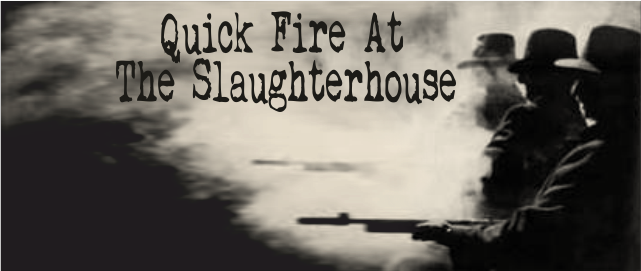
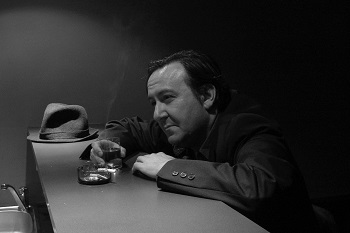 Get Kill Me Quick! from Amazon.co.uk , Amazon.com or any other Amazon.
Get Kill Me Quick! from Amazon.co.uk , Amazon.com or any other Amazon.
